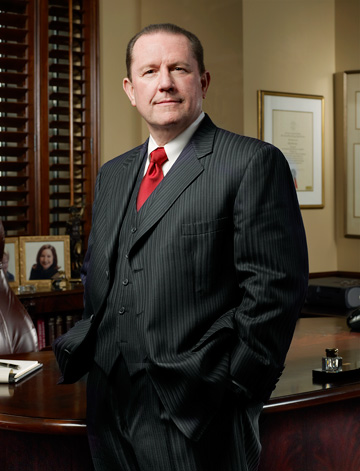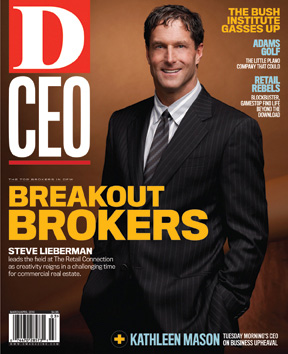The old chestnut “it takes one to know one” has been cited in contexts too numerous to count, from ex-jocks and coaches lending their insight to sports commentary to former computer hackers assisting law enforcement against cybercrime. When it comes to dispensing divorce advice to corporate America, the truth of that phrase is embodied in Dallas’ Mike McCurley, one of the leading matrimonial lawyers for the executive set. In an economic climate that has been particularly harsh on the legal profession, McCurley’s boutique family law firm has thrived by adopting a different business model: being run like a corporation.
At McCurley Orsinger McCurley Nelson & Downing, McCurley is the CEO, with a board of directors—comprised of partners in the firm—that meets weekly. McCurley says divorce representation traditionally comes from one of three sources: large, “full-service” law firms with a small section of family law specialists; solo practitioners or very small firms that handle divorces along with whatever other business comes in the door; and mid-sized firms that might boast nothing but matrimonial attorneys, but which are actually structured like a loose collection of sole practitioners working under the same roof, each of whom work on his or her own docket of cases.
In contrast, McCurley says, his firm employs a team approach where all members enjoy a working familiarity with each case, embracing an interactive structure in which all lawyers (whether they’re in the firm’s main office in Dallas or its San Antonio outpost) are able to communicate at any given moment about a case. According to McCurley, a 39-year veteran of the divorce wars, “We meet every week, discussing every case. I don’t know any other firm that does that.”
Indeed, forensic psychotherapist Michael Bickers, who has worked on numerous cases with McCurley and his team over the last 12 years, says, “Never call [McCurley] on a Tuesday morning. They’re all in a staff meeting like a CEO and his board of directors.”
Bickers, who has worked with dozens of area family law firms, has not observed this boardroom-like leadership structure in other shops. It’s hardly surprising, he says, that McCurley’s firm has served as a “hell of a training program” from which “powerhouse” lawyers have emerged to start firms of their own, like corporate subsidiaries being spun off into separate companies.
In many ways McCurley’s firm resembles a corporation’s multiple divisions, functioning together as a collection of specialists, each member cross-trained in other skill sets that serve the whole. “We demand that everyone be broad-based, even though each lawyer may have a particular strength,” McCurley says. “We don’t have lawyers that do only collaborative law, for example, or only appellate law—even though our appellate section has been hired by more divorce practitioners than any other family law firm I know of.”
Bickers cites McCurley Orsinger partner Scott Downing as an example of this approach. “Scott is extremely well-trained and experienced in cases involving substance abuse—and not may lawyers are—but he’s more valuable to the firm on higher-dollar property division cases,” he says.
McCurley’s move away from the traditional law firm model began some eight to 10 years ago. But as the economy began its downward spiral, McCurley Orsinger accelerated its embrace of the team approach. The reason for the change was simple: The needs of the firm’s high-profile corporate executive clients demanded it.
“We’re a 24/7 law firm because CEOs expect that,” says McCurley, 63. “If the concept of rising to the top didn’t exist, we wouldn’t have CEOs. They’re used to making decisions, and making them timely. In order to do that, they need the expert—a lawyer with a high level of competence and the correct information. And they need it sooner, rather than later. If the answer is ‘I’ll have to meet with my partner and get back with you,’ you’re not meeting the client’s need.”
Business Understanding
Achieving those results also means eschewing some traditional law-firm hiring practices. Neophyte lawyers, part-timers, and liberal arts majors may find it tough landing a job at this shop. Many lawyers at the firm have undergraduate degrees in business, economics, math, or accounting—a reflection of McCurley’s philosophy that the best divorce lawyer for an executive is someone who understands business.
“Why would you put the dissolution of your most important asset—your marriage—in the hands of people who don’t understand business?” McCurley says. The firm has attorneys fluent in Spanish, German, and French (a Japanese speaker is needed, McCurley says), a nod to the global economy that is responsible for a growing number of the firm’s clients. For McCurley Orsinger, fulfilling client expectations has meant choosing quality over quantity—the firm currently has 17 lawyers, with a clear game plan to never exceed 20—and tailoring its procedures to reflect an individual client’s needs.
Delivering on high client expectations—McCurley has handled at least 13 cases in states besides Texas—means having a good sense of timing as well. For some executives, a down economy may very well be the best time for a divorce. Particularly with closely held businesses, McCurley points out, “valuation can be everything.”
As the economy recovers, McCurley has this advice for CEOs contemplating divorce: “A successful divorce for the CEO is about planning,” he says. “You don’t want to be caught in the crisis approach. It’s all about preparation, like preventative information gathering. You want to stay away from the volcanic eruption of divorce.”
McCurley credits some of his success in representing executives to one of his other passions. For the last five years, he has been a “life coach”; in fact, he and his wife and law partner, Mary Jo McCurley, both became certified personal-enhancement coaches. He feels it’s made him a better lawyer. “The people I represent are used to giving advice, not taking it,” McCurley says. “Not everyone receives information the same way. Coaching is about learning how to speak each person’s individual language [to] assist them.”
Of course, running his law firm like a corporation and being attuned to an executive-client’s needs doesn’t mean that everything is always about the bottom line. Just as responsible corporate citizens make giving back to the community a priority, McCurley and other lawyers with his firm have been recognized on various occasions for their commitment to pro bono work. Mary Jo McCurley was at the forefront of lawyers representing the hundreds of children removed from the Yearning for Zion polygamist sect, ultimately serving as legal guardian for five of the children, including a daughter of the group’s leader, Warren Jeffs. Though McCurley estimates that the firm’s time and effort in that litigation would have cost around $1 million, he chalks up the pro bono legal work as “part of our belief in giving back to our profession, our community, and society.”
When asked to single out one of the proudest moments in his career, McCurley doesn’t draw from the socialites, professional athletes, or captains of industry he’s championed over the years. Instead, he relates the story of “Sarah” (not her real name), a seminary student who married into a wealthy family, had a child, and temporarily lost custody during a bitter divorce. Just as the ex-husband’s well-financed divorce team was hammering Sarah, she found herself in McCurley’s office on a chance referral from a professor who knew the family lawyer. McCurley succeeded in getting her child back—and “squashing” the other side.
Whether dealing with a pro bono client like Sarah or a corporate titan, McCurley’s business-like courtroom approach puts him on what Bickers calls “a different level.” Says Bickers: “Seeing an opposing attorney walk into court with just his briefcase, while McCurley is already there with multiple staff members and boxes of documents, is like seeing Daniel walking into the lion’s den.”
John G. Browning is a partner at the law firm of Thompson Coe Cousins & Irons in Dallas, and an award-winning legal journalist. His book The Lawyer’s Guide to Social Networking will be published this year.






